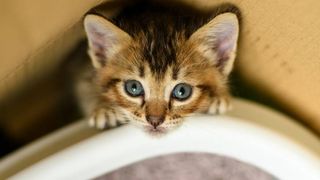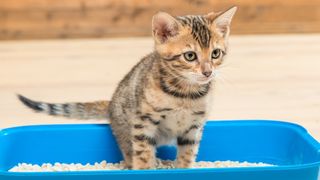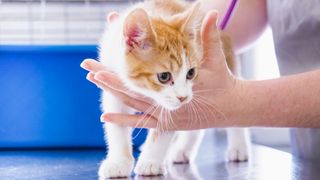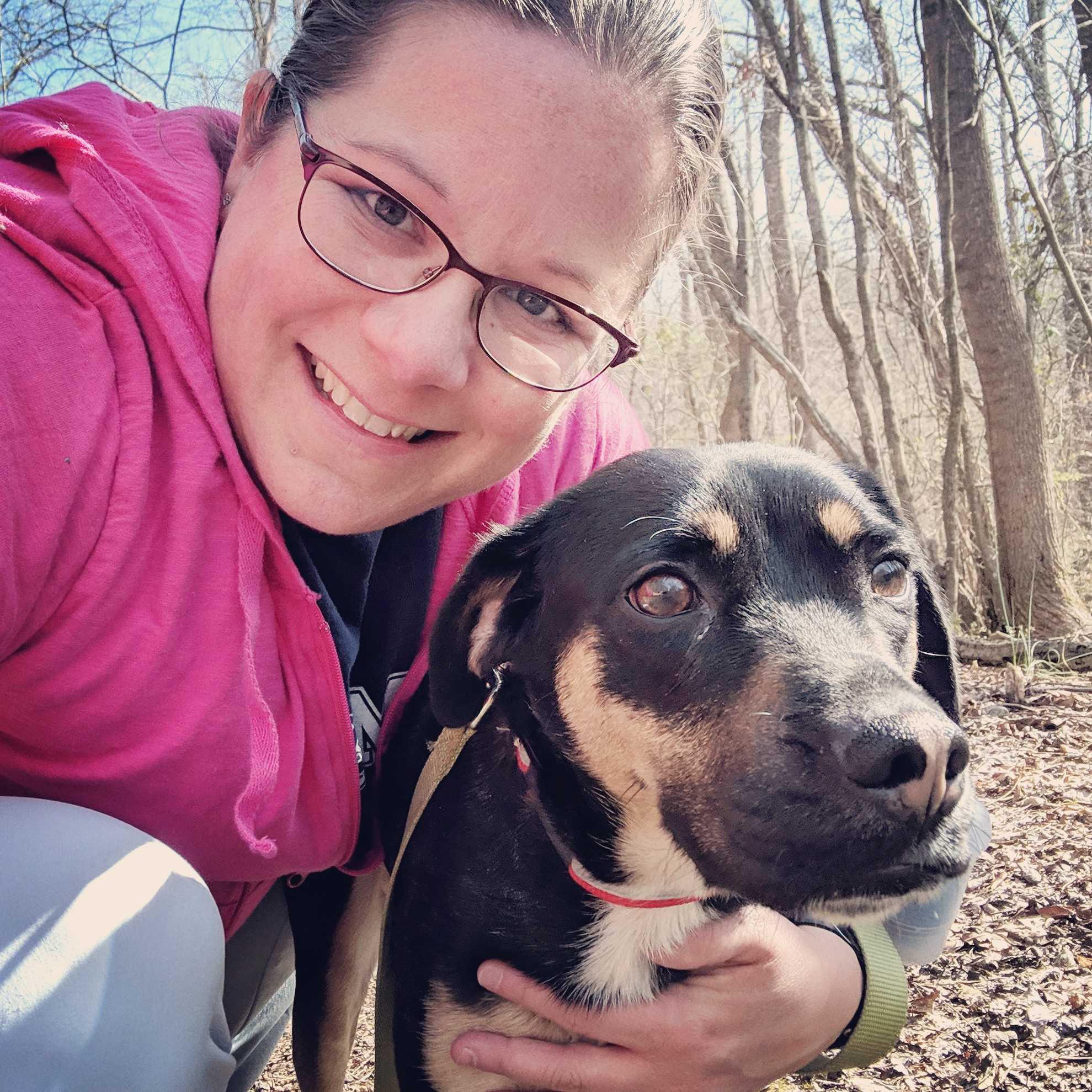Kitten constipation: Vet's guide to symptoms and treatment
Learn how to identify and treat kitten constipation with this handy vet's guide

Kitten constipation isn’t quite as common as diarrhea in kittens, but it can still pose a significant problem. If you’ve been feeding your little fur friend the best kitten food and you’ve noticed they’ve not produced any stools in several days, you may be starting to worry.
As pet parents, we spend a lot of time thinking about which kitten food is best to ensure our newest family member is getting all the vitamins, minerals and nutrients they need to grow up big and strong. But we might not always be as educated when it comes to what our kitten’s bathroom habits should look like.
It can be challenging to figure out when a kitten is constipated as how often they go to the bathroom will vary from feline to feline, with some pooping once a day or more and others less often.
Because of this, it’s important to look at your cat’s overall condition to assess whether constipation might be an issue. This includes their appetite, how tired they are, whether they’re vomiting and if they’re vocalizing excessively while in their litter box.
To assist you in this, we spoke to Dr. Catherine Barnett to get her thoughts on all things related to kitten constipation, including how to treat it at home and when to see a vet. Here’s what she had to say…..

Dr. Catherine Barnette is a small animal veterinarian with 14 years of clinical experience in small animal general practice. She currently divides her time between part-time clinical practice and freelance writing, while also volunteering in her community. Her primary medical interests are preventive medicine and client education.
Symptoms of kitten constipation
It’s not uncommon for young kittens to have slightly irregular bowel habits. You may not find feces in your kitten’s litter box every single day, and this doesn’t always mean that there is a problem. However, it’s important to be able to recognize constipation when it does occur, so you can address the problem before it becomes too serious.
In addition a lack of feces, other signs of constipation in kittens may include:
- Lethargy
- Decreased appetite
- Vomiting
- Straining to defecate
- Vocalizing in the litter box
- Accidents outside the litter box
If you are bottle-feeding a very young or newborn kitten, you will need to stimulate your kitten to defecate. Kittens under one month old are stimulated when their mother licks the area around their anus, and you can create a similar effect by stimulating your kitten with a moist, warm washcloth. You should stimulate your kitten before every feeding, and they should produce a small amount of stool. If your kitten has gone several feedings without defecating, this suggests possible constipation.
Finally, some constipated kittens can still produce small amounts of feces. Small amounts of liquid feces may be able to pass around a large ball of dried feces that is trapped within the colon. If your kitten seems to be having trouble defecating, even if they are still passing small amounts of stool, they could potentially be constipated.

Causes of kitten constipation
Dehydration is a common cause of constipation in kittens. Without adequate water intake, kittens can become dehydrated. In an effort to remain hydrated, they will reabsorb large amounts of water from their stool. Dry stool cannot be moved through the intestinal tract as effectively, leading to constipation.
An improper diet can also be associated with constipation, if the diet leads to stool that is difficult to transport through the intestines. Heavy intestinal parasite infections can block the movement of feces through the intestines, as can foreign body obstructions (a toy or string lodged in the intestines).
Less commonly, birth defects can make it difficult or impossible for a kitten to defecate, leading to constipation. In atresia ani, for example, kittens are born without an anus and therefore they are unable to defecate.
Treating kitten constipation at home
If your kitten is defecating less often than usual, but otherwise acting normal (eating, playing, and active), you can attempt basic home care.
First, ensure that your kitten is receiving plenty of water. If your kitten eats dry food, feed a canned diet or add water to your kitten’s food. In many cases, boosting your kitten’s fluid intake is all that’s needed to alleviate mild constipation. Read about the best wet cat food and the best kitten food for more dietary information.
Avoid giving your young feline milk, because this can actually trigger diarrhea in kittens; then you will have an entirely different problem to deal with!
Unless your cat is under a month old, you should not need to stimulate your cat to defecate. However, a gentle belly rub or vigorous play session can sometimes help trigger a bowel movement.

When to see a veterinarian
If your kitten is lethargic, reluctant to eat, or vomiting, you need to see a veterinarian. Constipation is often associated with dehydration; left untreated, this can be very serious for your kitten. Additionally, untreated constipation can permanently stretch your kitten’s colon, making your cat more prone to future bouts of constipation.
Your veterinarian will begin by performing a thorough physical exam, taking special care to palpate your kitten’s abdomen and feel for signs of feces accumulation. A fecal parasite examination may be performed to look for intestinal worms, and abdominal radiographs (x-rays) may be taken to assess the amount of feces present in your kitten’s colon. Your veterinarian may also recommend bloodwork or other tests, especially if your kitten appears seriously ill.
What do vets give cats for constipation?
Many cases of constipation are caused by dehydration. If your veterinarian feels that dehydration is causing your kitten’s constipation, they may administer intravenous (IV) or subcutaneous (under the skin) fluids to rehydrate your kitten. Fluid therapy alone may be adequate to help your kitten’s bowel movements return to normal.
Your veterinarian may also prescribe a laxative for your kitten. These medications are designed to help feces move through the digestive tract and be eliminated. In more severe cases, an enema may also be recommended, which may be performed under sedation or anesthesia.

Preventing constipation in kittens
Preventing constipation in kittens is largely focused on ensuring that you are feeding an appropriate diet and providing adequate amounts of water. If your kitten has had episodes of constipation in the past, feeding a high-moisture canned diet may prevent future problems. You can also add a small amount of water to your kitten’s food, in order to increase the moisture content of the diet.
Your veterinarian may also recommend a high-fiber diet, to increase the bulk of your kitten’s feces. In some cases, small amounts of canned pumpkin or other high-fiber additives may be recommended.
While you may be able to treat a mildly constipated kitten with home care, severe cases require veterinary attention. Ensure that your kitten is receiving adequate water; if necessary, you can feed a canned diet with water added. If your kitten does not respond to a diet change or shows other signs of illness, contact your veterinarian.
Enjoy this piece and looking for more great kitty content? The be sure to check out our guide to how to litter train a kitten.
PetsRadar Newsletter
Get the best advice, tips and top tech for your beloved Pets
Dr. Barnette is a graduate of the University of Florida, where she received both her B.S. in Zoology and her Doctor of Veterinary Medicine (DVM). She has 15 years of clinical experience as a small animal veterinarian, treating dogs, cats, and occasional exotic patients. She now works as a freelance veterinary writer, creating educational content for veterinarians, veterinary team members, and dedicated pet owners. Dr. Barnette lives in southwest Florida with her husband and daughter (plus two cats, a dog, and a rescued dove!) and enjoys kayaking, biking, and hiking. Learn more about Dr. Barnette at www.linkedin.com/in/catherinebarnette.
